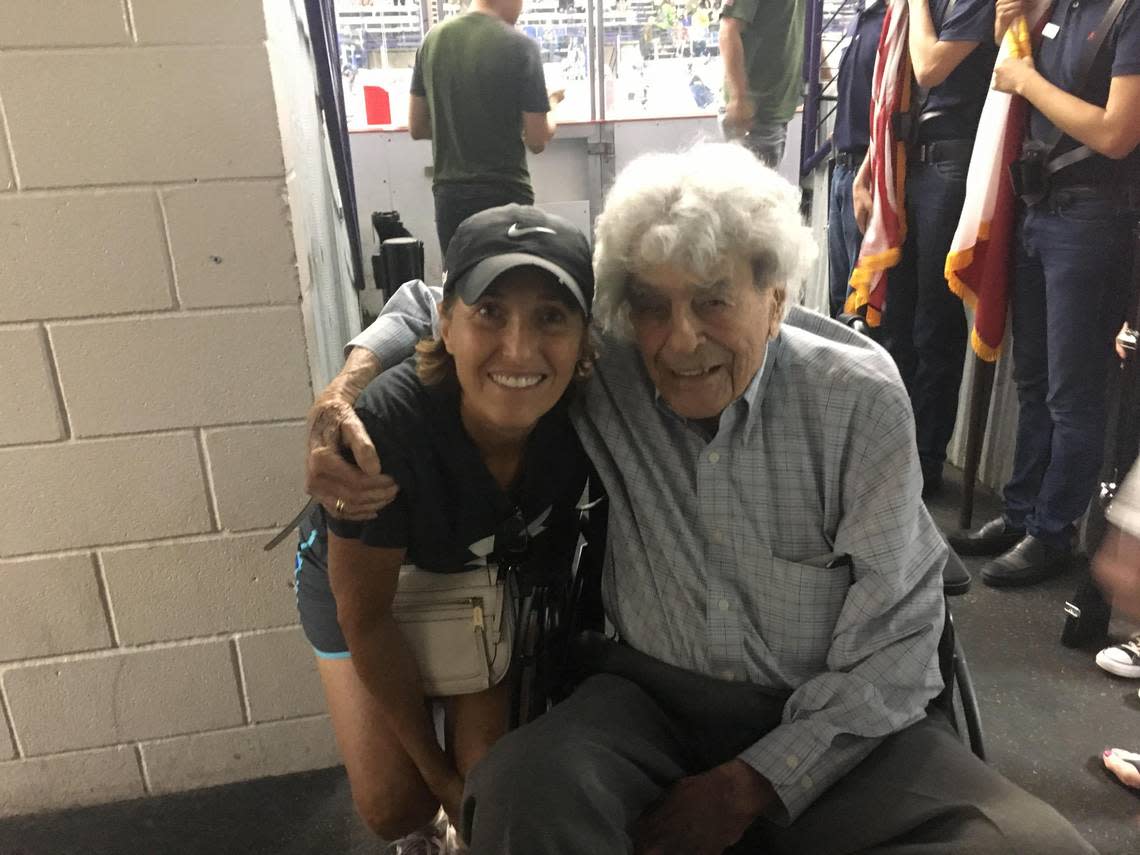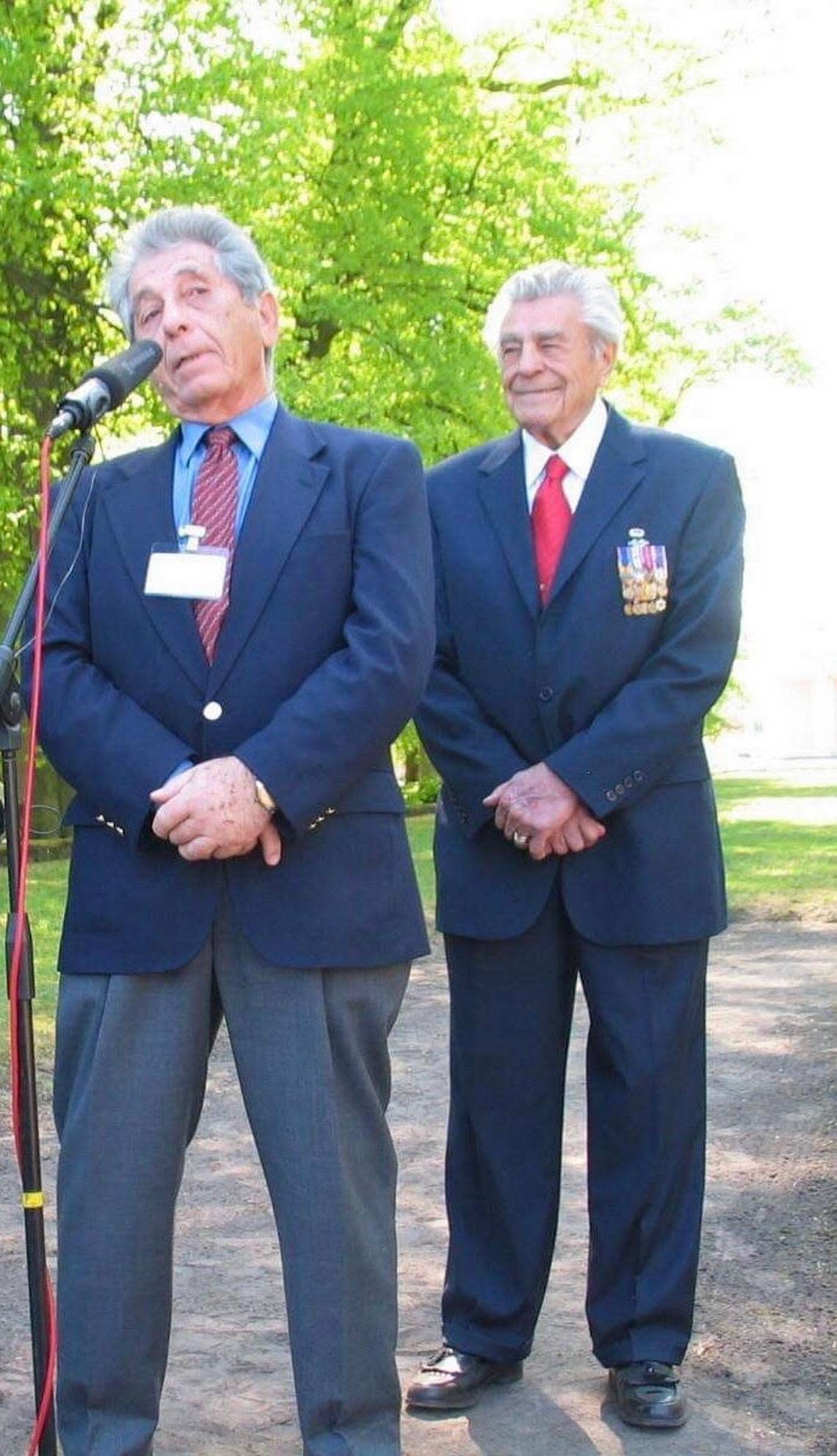Colleyville woman honors soldier who liberated her father from Nazi concentration camp
Anna Salton Eisen will never forget the day she introduced her father to Lt. Col. James Megellas, who liberated him from a Nazi concentration camp shortly after Adolf Hitler’s death.
On Friday, Eisen is attending the funeral of James “Maggie” Megellas, who died on April 2, 2020 at age 103.
Megellas, a Medal of Honor nominee, will be laid to rest Friday afternoon at Arlington National Cemetery in Virginia.
“That experience of becoming free, becoming liberated was more powerful than the suffering, the beatings,” Salton Eisen said, describing how the liberation from the Wöbbelin concentration camp in northern Germany affected her father.
She described how her father, George Salton, was 17 years old and weighed 75 pounds when Megellas found him and other starving survivors in May 1945.
Salton, who was born in Przemysl, Poland, spent three winters without socks, without proper clothing and food.
Being liberated from the Wöbbelin concentration camp was a “pivotal” experience in her father’s life, Salton Eisen recalled. George Salton and Megellas were on opposite sides of the barbed wire, but the experience stuck with both men, she said.
Salton Eisen said she was grateful for the opportunity to bring her father to Colleyville to meet Megellas in 2005. She said she read about Megellas in a news article and realized they only lived about five minutes apart.
George Salton died in March 2016 at age 88.
Salton came to the United States where he joined the Army and worked for the Pentagon, where the GI bill helped to rebuild his life.
“It was such a unique relationship. The fact that I can go and pay my respects, my father would have approved,” Salton Eisen said.
A decorated hero
Megellas was born on March 11, 1917 in Fond du Lac, Wisconsin. During the Great Depression, he worked for the Civilian Conservation Corps to help support his family.
After he graduated from Ripon College, he enlisted in the Army in 1942 and volunteered for the newly formed 82nd Airborne Division where he led the H company, 504th battalion of the 82nd Airborne as a first lieutenant, and spent the next 29 months fighting in some of the most important battles in the European Theater Including Anzio, Operation Market Garden and the famed Waal River crossing, and the Battle of the Bulge.
Megellas is the most decorated officer in the history of the 82nd Airborne with the Distinguished Service Cross, two Silver Stars, two Bronze Stars with V for Valor, two Purple Hearts, Presidential Citation with cluster, the Belgium Fouragère, 6 Campaign Stars, and Master Parachutist badge and was nominated numerous times for the Congressional Medal of Honor.
He helped liberate the Wöbbelin concentration camp on May 2, 1945 and wrote about his experience in his bestseller, “All the Way to Berlin: A Paratrooper at War in Europe,” written in his 80s.
A quote from Megellas’ memoir reads, “It was not until our men witnessed this that we fully realized what we had been fighting for. The destruction of the monstrosity the Nazis had created was the cause greater than ourselves that we had often alluded to but never fully understood. It was a defining moment in our lives: who we were, what we believed in, and what we stood for.”
Spreading a message of peace
After the war, Megellas returned to Wisconsin where he was president of the Fond du Lac city council. He then ran for Congress and also campaigned for John F. Kennedy. Kennedy appointed Megellas USAID mission director to Yemen, and he also held those positions in Colombia and Panama.
During the Vietnam War, Megellas was also head of the Civilian Operations and Revolutionary Development Support (CORDS).
He never forgot about his brothers in the 82nd Airborne Division, traveling to Afghanistan three times while in his 90s.
He also formed the Maggie Megellas foundation where he spread the message, “The greatest generation has not yet been born. They will be the generation that does not send its young people off to die in wars but rather learns to live in peace. The Lord did not put us on this earth to kill each other.”
For Salton Eisen, the message of peace is just as important as she continues her work to educate people about the Holocaust.
“The (Holocaust) survivors will be gone,” she said. “The next generation don’t always know their parents’ stories. I don’t know how many will be out there telling the stories.”



